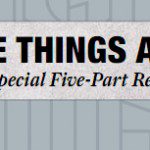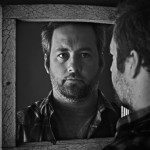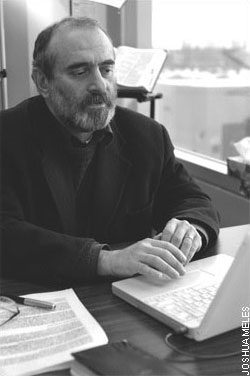Pros vs. Joes
Updated January 23, 2010, 8:24 p.m.
Fenced in by wire and concrete, guarded by thousands of police officers dressed in riot gear with gas masks and shields, G20 leaders gathered inside the Metro Toronto Convention Centre at the end of June for their fourth summit. Police had already made 32 G20- related arrests in the week leading up to the meeting that began on June 26, 2010, but by the end of the weekend, after several protests, riots and acts of vandalism, the tally rocketed to more than 1,000. Although already astonished by the level of violence in the city and the rising number of arrests, there was one moment that clearly surprised CTV News Channel reporter Scott Laurie while on air: the arrest of his producer, Farzad Fatholahzadeh. The crew immediately turned to catch a shot of two police officers escorting their colleague away, his hands behind his back, secured by a plastic tie, his press pass in clear sight around his neck.
Fatholahzadeh wasn’t the only one representing the “legacy” media who was cuffed, roughed up or booked by police that unsettling weekend. Others included The Globe and Mail’s social media columnist Lisan Jutras; National Post photographers Brett Gundlock and Colin O’Connor as well as Post interns Liem Vu and Cory Ruf; The McGill Daily reporter Stephen Davis; and Torontolife.com freelancer Aaron Leaf.
Then there were the “alternative,” or “independent,” or even freelance journalists who were accorded similar treatment. One was Jesse Rosenfeld, a Canadian freelancer writing for the Guardian’s online Comment Is Free section. When Steve Paikin, host of tvo’s The Agenda, caught sight of Rosenfeld’s arrest, he took the news to his Twitter page, tweeting “the journalist identified himself as working for ‘the guardian.’ he talked too much and pissed the police off. two officers held him”; “a third punched him in the stomach. totally unnecessary. the man collapsed. then the third officer drove his elbow into the man’s back”; “no cameras recorded the assault. and it was an assault.” Police charged Rosenfeld with breach of the peace, though this was later dropped.
Others included Jesse Freeston, of the alt-media site The Real News Network; Adam MacIsaac, who was covering the summit for the Canadian Youth Climate Coalition; and Amy Miller, a Montreal-based freelance journalist who contributes to little-known monthly magazine The Dominion.
Naturally, Canadian media organizations were outraged. “When a major disturbance occurs in Canada’s largest city, the role of the journalist is to inform the public,” said Arnold Amber, president of Canadian Journalists for Free Expression, in a press release following the protests. “There is no reason for them to have been detained or attacked while doing their work.” The Canadian Association of Journalists president, Mary Agnes Welch, echoed Amber in a public statement: “This kind of behaviour by police toward the media is not acceptable in a democracy like Canada.”
The expressions of disapproval weren’t confined to Canada. On his organization’s website, Anthony Mills of the International Press Institute said, “We are concerned at the reports that journalists covering the G20 summit were arrested and allegedly assaulted by police.Journalists have a right to cover such events, including any protests that accompany them, without interference or harassment from police.”
Soon, though, the collective outrage over the treatment of their fellow journalists began to splinter. On Sunday, June 27, the G20 leaders and their entourages started heading home, but even as the security fences were coming down, the clash over who exactly constitutes “the media” was escalating.
Globe reporter and columnist Christie Blatchford touched off the first skirmish with her July 2 column. She was blunt: just because you’ve published your opinions on a website doesn’t make you a journalist. “First, journalism is not merely a collective of the self-anointed,” she declared. “For all that it may not be a regulated profession, neither is it just a coming together of people with cellphones, video cameras and blogs as receptacle [sic] for an apparently endless stream of unfiltered, unedited consciousness.” In regard to the various independent or alternative journalists who have complained about their treatment, she wrote, “[L]et us not pretend that these folks are working journalists or that they are the equivalent.”
Why? “Their work isn’t subject to editing or lawyering or the ethical code which binds, for example, the writers at the Globe. The websites on which they appear don’t belong, as do most reputable newspapers in this province, to the Ontario Press Council, a body which hears complaints against traditional journalists and publications.”
A few days later, Ira Basen, a columnist for CBC.ca who has worked for CBC Radio since 1984, published “The New Journalism and the G20,” exploring the same issue somewhat less acerbically. He welcomed the trend toward media democratization—“the ability of people who were previously denied a voice in the mainstream to now have their voices heard is undeniably a cause for celebration”—but pointed out that there is a definite downside: “When everyone is a journalist, no one is a journalist.”
Basen also noted, “Almost everyone in that crowd had some sort of camera-equipped mobile device, which meant that, in the minds of the police, almost everyone was a potential journalist.” Jennifer Hollett, a reporter with CBC NN’s news talk show Connect with Mark Kelley, was a case in point. On the Saturday of the G20, she was about to take a photo of a protester being arrested when a police officer advised her not to. “I’m with the CBC,” she said. “After a day like today,” he replied, “I don’t care.”
While most others working for traditional outlets had received bona fide passes, Hollett carried only her CBC ID. However, others denied “real” accreditation could seek help from the Alternative Media Centre, which was closely allied with the Toronto Media Co-op, “a network of member-supported, local, democratic news organizations across Canada.” The amc encouraged media makers to apply for passes via its website, and 80 to 100 did. But, as Fatholahzadeh’s and others’ experience showed, it didn’t really matter what, if any, kind of credentials anyone had, a confirmation of Basen’s point about the disappearing line between the professional and the amateur.
The Globe’s Lisan Jutras, for example, followed cyclist protesters as they rode around the city, not on official assignment and without G20 ID. She was detained for about five hours on the Sunday evening. Still, she doesn’t see the blurring of the line between “real” and “amateur” as a bad thing. The media, she believes, should not be given special treatment, as it creates a distance between a journalist’s view of the news event and what’s actually happening, which skews what gets reported. However, she thinks journalists should be able to do their job. As Basen says over the phone, “It’s useful to have a group of people who have been authorized by whomever, whether it be the government or the army, to get special access to be able to tell stories.”
In her column, Blatchford offered another take, saying that although media accreditation provides some privileges—“such as sports dressing rooms and backstage at concerts”—alternative journalists covering the protests ought not complain, because “the press pass doesn’t grant even traditional journalists carte blanche access everywhere.”
Many readers took issue with such statements, which suggested an obvious disdain for citizen journalists. One wrote to say Blatchford should “show some respect for alternative journalists who are not the privileged and coddled”; another countered, “Citizen journalism provides an alternative to the highly censored and manipulated ‘mainstream journalism’ you defend.” Her piece attracted more than 350 responses, many critical of her perspective. Kevin Wood, a Tokyobased Canadian journalist, offered perhaps the most detailed rebuttal. On July 13, he wrote a fired-up, lengthy response, breaking the column down into analyzable bits and taking issue with each point, frequently with a heavy dose of sarcasm. His conclusion: “Blatchford’s attempt to smear [independent journalists] as some sort of lying amateur wannabes just because they don’t work in her office is dishonest and dishonorable.”
However, for Dan Gillmor, a director of the journalism program at Arizona State University and a columnist for Salon.com, an online arts and culture magazine, the question is not “Who is a journalist?” but rather “What is journalism?” In his August 26, 2010, column, “Who’s a Journalist? Does that Matter?,” he noted, “As digital media
become ubiquitous and more and more of us communicate and collaborate online, every person is capable of doing something that has journalistic value.” Still, he struggles with what to call creators of new media, saying that the word “journalist” comes with some baggage, which creates an illusion of a higher role in the profession than a “columnist” or “reporter.”
One step toward closing the gap between old-school journalists and everyone else occurred in 2004, when political bloggers earned press credentials to cover the Democratic National Convention in Boston. Thomas McPhail, professor of media studies at the University of Missouri–St. Louis, disagreed with the move, arguing that they couldn’t cover issues as fairly or professionally as mainstream media. However, the decision was an acknowledgement that bloggers with large audiences—including Ana Marie Cox, founding editor of Washington gossip site Wonkette; Stephen Yellin, a then
16-year-old high school student writing for DailyKos; and Jeralyn Merritt of TalkLeft—were becoming influential disseminators of information with a different take on news from the one the “legacy”media delivered.
But while the bloggers were granted equal privileges, were they journalists? Not many, according to Alan Knight, professor of journalism at the University of Technology Sydney in Australia. In a 2008 article, “Who Is a Journalist?,” he suggests only people who employ “professional practices within recognized codes of ethics” are—a standard that he says filters out many bloggers.
Gillmor offers a more generous definition, arguing that citizens can produce content that has the potential to be just as valuable as traditional media: “Some things have a journalistic function and some things don’t; the nature of the medium has nothing to do with it.” In a 2003 Columbia Journalism Review article, he said that the new media have allowed journalism to evolve into a conversation between producers and consumers: “Our readers collectively know more than we do, and they don’t have to settle for half-baked coverage when they can come into the kitchen themselves.”
While CBC’s Hollett agrees that citizen journalists do have voices that need to be acknowledged and thinks the growth in new media is exciting, she stresses her preference for the term “citizen media” over “citizen journalists.” “I think, at the end of the day, there still is a difference between journalism and videotaping something on the street,” she says. “I think the two work together and I think the two are part of a puzzle.” While citizens creating media may contribute to the news, she notes, it is journalists who provide context.
Similarly, Basen doesn’t dispute the value of citizen journalism, admitting that during the G20, members of this group had a stronger understanding of the stories on the streets than many mainstream journalists did, and he says that working together could even improve the quality of journalism. For example, he says that although Rosenfeld might be a journalist, he is a different kind of journalist from those in mainstream media and he’s going to produce a different kind of story. As Basen wrote of Rosenfeld in his CBC.ca piece, “He blogs for a Guardian site called Comment is Free, where just about anyone can say just about anything they want.” Mainstream media follow a code of ethics and abide by policies and standards, and their work undergoes some sort of verification, whether it’s fact-checking or reporter-editor conversations; however, Basen points out verification of citizen journalism usually happens after something has been published. Within a few days, Rosenfeld complained to CBC that he had been misrepresented in Basen’s piece. In a letter, Kirk LaPointe, CBC ombudsman, responded. “In reviewing the column, I have concluded that it left some errant impressions, he wrote, saying that Comment is Free was just as “journalistically sound” as The Guardian and that Basen’s column failed to mention Rosenfeld’s contributions to other publications, including several from the Middle East. LaPointe cited the overlook to the changing definition of journalism and traditional news outlets seeking ways to work with citizen media. However, Basen believes that when it’s hard to distinguish between citizen and mainstream journalism, the reputation of mainstream media can suffer.”
While Basen supported CBC’s G20: Street Level Team blog, to which both staffers and private citizens posted summit coverage, he cites CNN’s online iReport, “where people take part in the news with CNN,” as straying too far from cnn’s news brand. Individuals can upload their own content, neither edited nor checked for accuracy. The result is content that ranges from a video clip of someone shot during a demonstration in Iran to a piece about a woman who feeds milk to a deer she calls “little girl.”
“I think CNN should have a greater degree of separation between what its mainstream outlet does and what its citizen journalism outlet does,” says Basen. In 2008, for example, iReport falsely claimed Apple cofounder and CEO Steve Jobs had suffered a heart attack. The rumour spread from the website to blogs to Twitter—former Globe communities editor Mathew Ingram even retweeted it—resulting in a dip in Apple’s share price. CNN brands itself as “The Most Trusted Name in News,” and as Basen points out, “That’s the kind of thing that takes years and years to build up and can be destroyed very quickly.”
The prospective danger when amateur and professional journalism meet can be greater than a scarred reputation. On August 23, 2008, gunmen kidnapped Amanda Lindhout, a self-described freelancer from Sylvan Lake, Alberta, just outside Mogadishu, Somalia. The then 27-year-old had spent time earlier in Iraq and Iran and published some columns in the Red Deer Advocate before heading to Mogadishu, but aside from that, her credentials were a little scant. At the time of her kidnapping, and during the 15 months she was held captive, the majority of news reports referred to her as a journalist or reporter.
Only after her release in November 2009 did her status become a point of debate. When Andrew Cohen, a columnist for the Ottawa Citizen and international affairs professor at Carleton University, wondered what Lindhout was doing in Somalia and why she was identified as a journalist, he articulated what some other mainstream journalists had been thinking. “She was said to be a model who considered becoming a beautician. Instead, she became a journalist, which may be close to the same thing at some levels of today’s celebrity culture,” he wrote, dismissing her as “an adventurer, a dilettante, a gutsy, friendly, chirpy naïf.”
The next day, National Post columnist Chris Selley defended Lindhout, arguing that she was in fact a real journalist and deeming her last piece for the Advocate just before her capture “an above-average piece of foreign correspondence.” He was shocked that anyone could make comments like Cohen’s about a colleague, adding, “She might be a foolish journalist, an almost totally unknown journalist, and a journalist who’s been an unwitting shill for the Iranian government. But it’s devastatingly obvious that she is, in fact, a journalist.”
It’s also devastatingly obvious the name-calling isn’t clearing the muddle. In a 2009 article in the British Journalism Review, “Them and Us: Is There a Difference?” Ivor Gaber, political journalism professor at the City University London, argued that drawing a line between the professional and citizen journalists isn’t what’s important. “Surely a
far better banner—for bloggers and journalists alike—to fight under would be: Let’s have some ethical standards.” As Gillmor suggests, maybe it’s the craft that’s evolving, not the creators, and it’s the act of journalism that matters, not who we call a “journalist.”
The distinction was certainly lost on those policing the G20 protests. Still, the confusion doesn’t excuse bad behaviour by the cops or bad decisions by editors and news producers. Since that weekend in June, there have been several first-person accounts about the way journalists were treated. But little was captured on tape. An exception is a Real News
video available on YouTube, which shows its reporter, Jesse Freeston, shooting footage when police began barging through a crowd of bystanders, ramming into him and shoving him aside. One officer swiped at his recording equipment and other officers jabbed him with a bike handle. Traditional media never aired that clip.
Correction: The original version of the article stated that Jesse Rosenfeld was a Canadian activist writing for the Guardian’s online Comment Is Free section. He was a Canadian freelancer writing for the Guardian’s online Comment is Free section. The Review regrets the error.
Correction: Within a few days after Basen’s CBC.ca article was published, Rosenfeld complained to CBC that he had been misrepresented in Basen’s piece. In a letter, Kirk LaPointe, CBC ombudsman, responded. “In reviewing the column, I have concluded that it left some errant impressions, he wrote, saying that Comment is Free was just as “journalistically sound” as The Guardian and that Basen’s column failed to mention Rosenfeld’s contributions to other publications, including several from the Middle East. LaPointe cited the overlook to the changing definition of journalism and traditional news outlets seeking ways to work with citizen media. This information was not included in the original article. The Review regrets the error
Michelle Medford was the Managing Editor (Online) for the Winter 2011 issue of the Ryerson Review of Journalism.













































